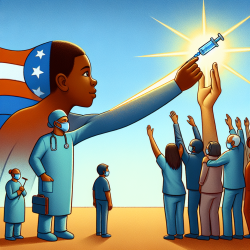Introduction
As a practitioner dedicated to fostering positive outcomes for children, staying informed about the latest research is crucial. The study titled "Measles-mumps-rubella vaccination timing and autism among young African American boys: a reanalysis of CDC data" offers valuable insights into the relationship between MMR vaccination timing and autism incidence. This blog aims to highlight the study's findings and encourage practitioners to consider data-driven approaches in their practice.
Understanding the Research
The study conducted a reanalysis of data from the U.S. Centers for Disease Control and Prevention (CDC) to explore the impact of MMR vaccination timing on autism incidence. The research focused on African American boys, revealing a statistically significant increase in autism cases among those who received the MMR vaccine before 36 months of age. Specifically, African American males showed a relative risk of 3.36 (p=0.0019) when vaccinated before 36 months compared to those vaccinated later.
Implications for Practitioners
These findings underscore the importance of considering vaccination timing as a potential factor in autism incidence, particularly in specific demographic groups. Practitioners can leverage this data to inform their practice and contribute to more tailored and effective interventions. Here are some ways practitioners can apply these insights:
- Data-Driven Decision Making: Use the study's findings to inform vaccination timing recommendations and discussions with parents, especially in African American communities.
- Advocacy for Further Research: Encourage and participate in further studies to explore the relationship between vaccination timing and autism across diverse populations.
- Collaborative Efforts: Work with healthcare providers, educators, and families to develop comprehensive strategies that consider vaccination timing as part of a holistic approach to autism intervention.
Encouraging Further Research
While this study provides valuable insights, it also highlights the need for additional research to fully understand the relationship between MMR vaccination timing and autism. Practitioners can play a vital role in advocating for and participating in such research efforts. By doing so, they contribute to a deeper understanding of autism and its potential triggers, ultimately leading to improved outcomes for children.
Conclusion
The study on MMR vaccination timing and autism among African American boys offers critical insights that practitioners can use to enhance their practice. By embracing data-driven approaches and advocating for further research, practitioners can contribute to more effective interventions and better outcomes for children with autism. To read the original research paper, please follow this link: Measles-mumps-rubella vaccination timing and autism among young African American boys: a reanalysis of CDC data.










